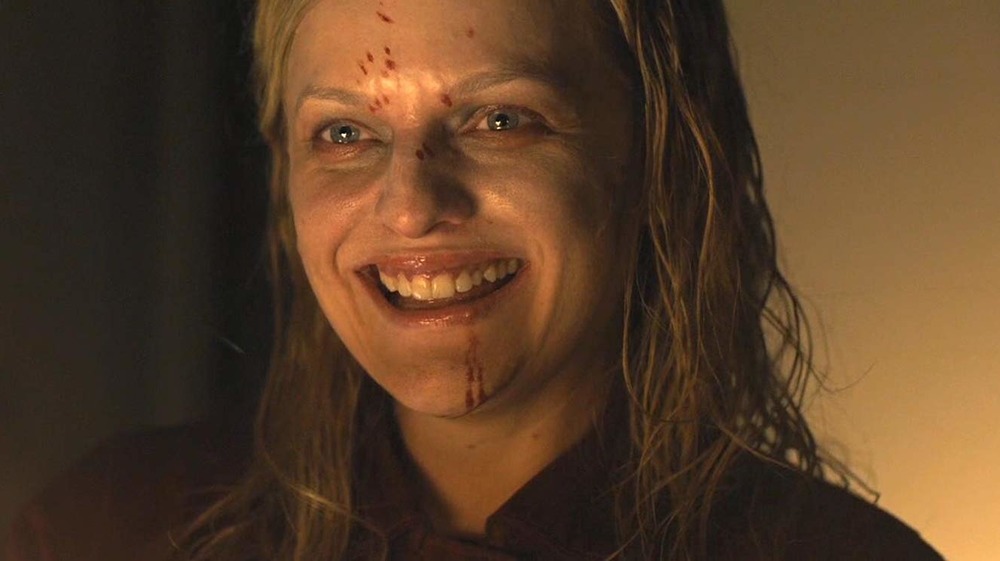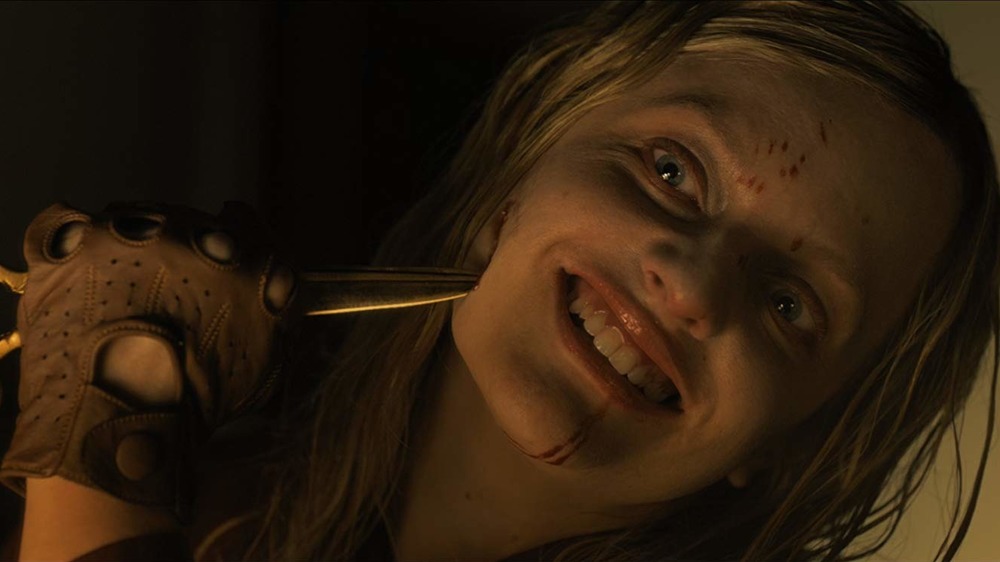The Secret Meaning Behind Elisabeth Moss's Character's Name In Us
Us, the 2019 doppelgänger horror movie from Jordan Peele, is wrapped up in symbolism. It's a constant subversion of expectation, a dark mirror which is only dark because of the evil we do on our side of it. Some of the best parts of Us are so veiled in that darkness you likely won't see them until the third or fourth rewatch — like the importance of the character names.
When the Wilson family encounters their doppelgängers, one thing they probably aren't thinking about is their names. If you were in the middle of a battle for your life against an amoral violent monster who wore your face, you probably wouldn't pause for introductions, either! But while all their faces may be the roughly the same, none of the duplicates have the same name as their real-world counterparts. And each name reveals something about a character and their counterpart. Zora Wilson (Shahadi Wright Joseph) and her double Umbrae are a perfect example: "Zora" is a derivation of the Slavic word for "dawn" and Umbrae is derived from the Latin for "shadow." The two characters are the light and dark versions of one another.
Not all the naming conventions are as simple or obvious. And one of the most interesting pairing of names comes not from the Wilson family but from their friends, the Tylers. Kitty Tyler (Elisabeth Moss) suffers a pretty horrifying fate at the hands of her double Dahlia. The story behind their names has two devastating real life parallels, and you probably didn't realize it.
Moss's characters in Us are named after murder victims
Elisabeth Moss plays both Kitty Tyler and Dahlia. Kitty is your prototypical wine mom, and Dahlia is a homicidal maniac. There's a pretty obvious bit of symbolism here: After all, how many moms do you know who don't have moments where they want to burn it all down? Kristen Wiig recently starred in an SNL sketch dedicated to the frustration of being the mom who does all the work and gets none of the credit.
However, further underneath the surface of these names are two very specific examples, not of violent women, but of women who have famously had violence done to them.
Kitty Tyler is likely named after Kitty Genovese, a victim of one of the most infamous murders in modern American history. On March 13, 1964, the 28-year-old Genovese was stabbed to death outside an apartment building in Queens, New York. There was a huge public outcry after The New York Times published an article about Genovese's death: The famous part of the story isn't that Genovese was killed, but that it was originally alleged that 38 people witnessed her death and did nothing about it. The reaction to that story was so strong that tests were done and a term called "the bystander effect" was coined. The term suggests that, the more people see something bad happen, the less likely any of them are to do something about it. The actual details of Genovese's death are more complex and misunderstood, for the record, but the original narrative has been repeated many times, nonetheless.
Tyler's tethered counterpart's name, Dahlia, is a little more obvious in its parallels, once you have Kitty Genovese on your mind. Elizabeth Short was a brutally murdered woman whose death in 1947, like Genovese's, became infamous. Short's bisected, brutalized corpse was cleaned and drained of all its blood. She became known as the Black Dahlia, hence the connection with Moss's character in Us.
But there's one more layer which makes these names relevant.
Kitty and Dahlia hold up a mirror to systemic racism
Jordan Peele utilizes a specific historical moment as a backdrop for Us: Hands Across America. On May 25, 1986, United States citizens gathered in huge numbers to hold literal hands from California across to New York. At the time it was seen as a huge success where Americans stood together to raise money and awareness to combat poverty, homelessness, and hunger. Peele sees Hands Across America a little differently with the distance of time. "There's something cult-like about the imagery that makes me think of the Manson family singing folk songs as they leave the courtroom," Peele said in an interview. "There's like an insistence that as long as we have each other, we can walk blindly past the ugliness and evil that we may be a part of."
Naming Moss's characters after two famous murdered women carries with it a similar meaning. There's often a huge outcry whenever a young white woman is murdered. On a societal level, we are only just beginning to acknowledge the imbalance. Historically, seldom has America dedicated its time to solving the murders of black women. Indeed, as mentioned earlier, even the common narrative for the murder of Kitty Genovese was not accurate — there were witnesses to her murder who did try to get help.
Us sidelines the white characters and their deaths, by design. We're so used to the opposite: it's always the Black characters who die first and don't matter as much. One of the points of Us is that holding hands or creating narratives around the deaths of one type of person doesn't do much to help the majority of people who are actually suffering.
In most horror movies, the Kitty and the Dahlia characters would matter most. In Us, they are a subtle nod to systemic racism, and nothing more.


